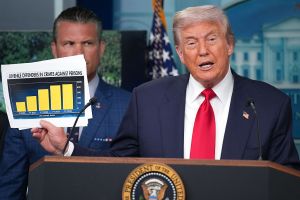The second Trump administration has begun as it means to go on: moving fast and breaking Washington brains. Firings commenced immediately, from inspectors general to senior FBI officials to workers who refused to go back to the office (for the federal government, the pandemic never ended). The confirmations blasted through the Senate, with even controversial figures like Defense Secretary Pete Hegseth rammed through in the first week.
Executive Orders flew out like a flock of war pigeons released from the battlements — forty-five in the first two weeks alone — bearing commands small and sweeping. Some of them were real: withdrawal from climate treaties and the World Health Organization, an end to diversity, equity and inclusion programs and the alphabet soup of genders in government documents — and sending troops to the border. Some of them were framed as a backwards look at government interference — on free speech, leaking, and the “weaponization of federal government.” Others were just because: renaming Alaska’s Mount Denali back to Mount McKinley and the Gulf of Mexico to the Gulf of America, and the forced declassification of records around the assassinations of John F. Kennedy, Robert F. Kennedy, and Martin Luther King. That’s what you get for your endorsement, Joe Rogan — enough podcast material for years.
Trump had repeatedly promised that his retribution would be victory and success for the country. But he also knows there’s no better time to kick a man than when he’s down. If you are, for instance, one of the fifty signatories of the notorious Hunter Biden laptop letter, your security clearance was forfeited.
If your name happens to be John Brennan, Michael Hayden, Leon Panetta, James Clapper or John Bolton, you have the additional ignominy of being banned from federal government buildings. Are you a former high-level official who wants a security detail? Pay for it from your (doubtlessly) ill-gotten gains. The power on display from Elon Musk was apparent from day one, and not just because he took Vivek Ramaswamy out back and put two behind his ear for an ill-thought-through X thread bashing lazy Americans. There was never room for more than one ego at DoGE. The New Yorker cover for January 20, Inauguration Day, showed a laughing Musk with his hand on the Bible, getting side-eye from a sidelined Donald. I showed the magazine to one of the president’s closest advisors, who responded: “I worry that’s more true than I’d like to say.”
Nothing that has happened since would give you a reason to think otherwise. Musk has flitted about DC with his exuberance and manic energy for finding the weak points in decrepit mechanisms. His team of compatriots were roundly denounced as too young and inexperienced to be trusted with any power, even just the power to examine inefficiencies and recommend how to fix them. When WIRED magazine reported the names of several of his DoGe staffers, all under the age of twenty-four, Mike Solana wrote in his Pirate Wires newsletter (a must-read in the second age of Trump):
This much power (auditing government spending) in the hands of men this young (the age of our founding fathers) was unfathomable, we learned… from the same people who played block and tackle for a man with actual dementia. And that really is the question: would you rather have a 22-year-old engineer who designed an AI program that helped decipher one of the 2,000-year-old Herculaneum Papyri working for the government, or a much dumber old person?
The haughty tech-bro energy aside, the problem for the bureaucrats and their lifelong defenders in the Democratic Party is that they are the most unsympathetic figures in this entire storyline. They have brought their evisceration on themselves, having micromanaged the American people to such a degree during the pandemic that the citizenry no longer cares for their sky-is-falling complaints, especially when they’ve all been offered eight-month buyouts if they want to stop working. By the time a judge temporarily blocked the program in early February, more than 60,000 workers had signed up
When the Trump administration announced that every agency would have to go back to the office to work within thirty days, some of the crats took to public radio to complain. Here is one typical tale of woe related to Baltimore’s WYPR, from a federal worker who currently goes into an office twice a week — her middle name “Layne” is used out of “fear of reprisal”:
“The train ride is anywhere from about forty minutes to an hour. I wake up at 4:10, in the morning, and I get to work bright and early, between about 6 a.m. and 6:15,” she said. She leaves the office at 3 p.m. and gets home around 5. Most weeks she works in-person on back-to-back days.
“I’m so exhausted at the end of the day,” Layne continued. “By that third morning, when I’m waking up and teleworking, I am just so brain dead, it’s actually hard to focus… I cannot imagine trying to get in the car and go in a third day.”
Yes, in a time of people taking second jobs in the gig economy just to make ends meet, won’t someone think of the torturous conditions of our federally funded best and brightest, who, after spending years dutifully doing as little as possible while avoiding the attention of Congress and staying home five out of seven days a week, are suddenly commanded to commute for an hour to show up for something approximating a normal work schedule? Oh, the inhumanity.
Nothing is so motivating for elected Democrats as the screams of wronged bureaucrats, and when Musk and his DoGE team turned their sights on the United States Agency for International Development, it was a siren call for the politicians. A highly motivated group of the Congress-critters showed up at the USAID office to decry the “constitutional crisis,” including newly elected Congressman Eugene Vindman (technically of Virginia, but in reality representing the Deep State), who attempted to enter the locked headquarters and were denied.
The whole thing seemed a tad insurrectiony, albeit without velvet ropes for guidance. For Senator John Kennedy of Louisiana, it was just pathetic: “To my friends who are upset, I would say with respect, call somebody who cares,” Kennedy told Fox News. “They better get used to this.”
Next up: the Department of Education, a longstanding target of Republican candidates for decades yet one they never had the stones to touch once elected. Referring to his choice for education secretary, Linda McMahon, the president told reporters: “I want her to put herself out of a job.”
What this initial rush signals for the future of the Trump administration is that the lessons he took from his first go-round include the importance of power to drive momentum.
This dramatic surge of force is intended to overwhelm his enemies, giving them so many targets to attack that they can’t afford to give their full attention to any one of them. Doing battle across multiple legal fronts on all the executive orders, firings and steps announced both foreign and domestic leave Trump’s opponents exhausted, just running to stand still.
Susie Wiles, his new chief of staff, has held to a mantra of avoiding drama or delay. She displays an understanding that given the reality of the midterms, they have just eighteen months to get most of Trump’s ambitious agenda into the field before inevitably taking on all the weight of the unexpected that comes in every presidential term, particularly second terms. The narrow majorities in the House and Senate will have to hold firm, and there’s no time for Republicans who want plaudits from the New York Times.
For the moment, those Republicans seem to be keeping quiet. When the nominations of three of Trump’s more controversial choices — Tulsi Gabbard for director of national intelligence, Robert F. Kennedy Jr. for Health and Human Services, and Kash Patel to head the FBI — arose in the same week on Capitol Hill, Trump, J.D. Vance, and their allies made quick work of any nods toward party opposition. Senators Bill Cassidy of Louisiana, Thom Tillis of North Carolina and Todd Young of Indiana bowed to internal and external threats — sometimes just an Elon tweet — and the nominations rolled forward with party-line committee votes.
This time, everything is different. Mitch McConnell may have been leader of the Senate Republicans for the past eighteen years, but his opposition in his twilight period will be token votes at best. “I expect to support most of what this administration is trying to accomplish,” he told CBS’s 60 Minutes. “So, what happened in the past is irrelevant to me.”
When asked about his comment that January 6 was “evidence of Donald Trump’s complete unfitness for office,” McConnell answered: “I said, shortly after January 6, that if he were the nominee for president, I would support him.” The resistance has gone out with a whimper. For Team Trump, it feels like the only thing that can stop them now is themselves.
This article was originally published in The Spectator’s March 2025 World edition.


























Leave a Reply